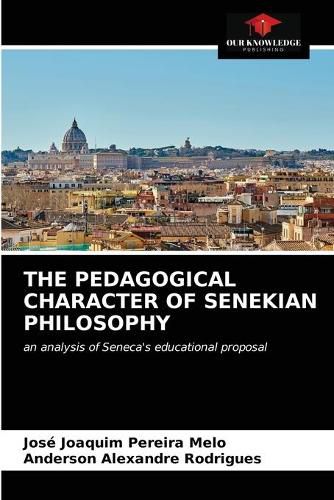Readings Newsletter
Become a Readings Member to make your shopping experience even easier.
Sign in or sign up for free!
You’re not far away from qualifying for FREE standard shipping within Australia
You’ve qualified for FREE standard shipping within Australia
The cart is loading…






This title is printed to order. This book may have been self-published. If so, we cannot guarantee the quality of the content. In the main most books will have gone through the editing process however some may not. We therefore suggest that you be aware of this before ordering this book. If in doubt check either the author or publisher’s details as we are unable to accept any returns unless they are faulty. Please contact us if you have any questions.
This book aims to reflect on the pedagogical character of philosophy in Seneca (4 BC-65 AD). It sought to analyze the Senekian Stoic understanding of education, human nature, the supreme good and the role of philosophy in human formation. In Seneca, man is conceived as a corporeal and spiritual being, so he is the bearer of a fragile nature and susceptible to the evils of this life, but he is also the possessor of a superior attribute, human reason. By living according to his own nature, man can attain the supreme good, namely, the virtuous life, happiness and perfection. Now, therein lies his pedagogical optimism, the possibility of human regeneration from the formative process of self-education. This regeneration is possible thanks to education and philosophy, so that they concretize the formation of the ideal Senekian man, the wise man. Therefore, this research is relevant to the area of studies of academic productions, especially from an analysis focused on the studies of philosophy and education in antiquity.
$9.00 standard shipping within Australia
FREE standard shipping within Australia for orders over $100.00
Express & International shipping calculated at checkout
This title is printed to order. This book may have been self-published. If so, we cannot guarantee the quality of the content. In the main most books will have gone through the editing process however some may not. We therefore suggest that you be aware of this before ordering this book. If in doubt check either the author or publisher’s details as we are unable to accept any returns unless they are faulty. Please contact us if you have any questions.
This book aims to reflect on the pedagogical character of philosophy in Seneca (4 BC-65 AD). It sought to analyze the Senekian Stoic understanding of education, human nature, the supreme good and the role of philosophy in human formation. In Seneca, man is conceived as a corporeal and spiritual being, so he is the bearer of a fragile nature and susceptible to the evils of this life, but he is also the possessor of a superior attribute, human reason. By living according to his own nature, man can attain the supreme good, namely, the virtuous life, happiness and perfection. Now, therein lies his pedagogical optimism, the possibility of human regeneration from the formative process of self-education. This regeneration is possible thanks to education and philosophy, so that they concretize the formation of the ideal Senekian man, the wise man. Therefore, this research is relevant to the area of studies of academic productions, especially from an analysis focused on the studies of philosophy and education in antiquity.